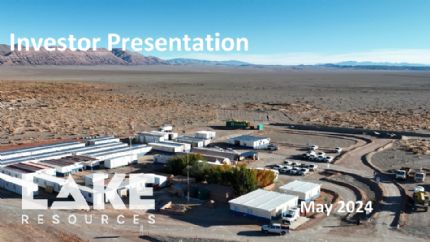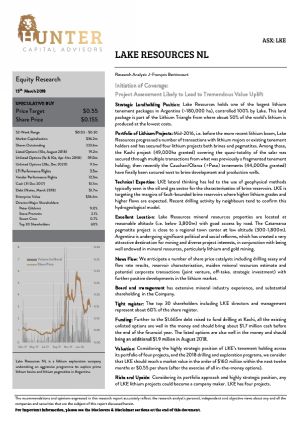lithium carbonate equivalent

JORC Update
Sydney, Nov 22, 2023 AEST (ABN Newswire) - Clean lithium developer Lake Resources NL ( ASX:LKE) (
ASX:LKE) ( LK1:FRA) (
LK1:FRA) ( LLKKF:OTCMKTS) is pleased to provide an updated resource estimate for the Kachi lithium brine Project ("Kachi" or the "Project") in Catamarca Province, Argentina.
LLKKF:OTCMKTS) is pleased to provide an updated resource estimate for the Kachi lithium brine Project ("Kachi" or the "Project") in Catamarca Province, Argentina.
The updated resource estimate is based on continued hydrogeological characterization since the last update in June 2023 and refined interpretations of the hydrostratigraphy, hydrogeology and hydrogeochemistry.
- Deeper drilling to 600 m bgs has led to significantly larger resource estimates.
- Measured and Indicated Resources have increased from 2.9 to 7.3 Mt of lithium carbonate equivalent defined to a depth of 600 meters over 143.8 square kilometres.
- The updated total resource estimate exceeds 10.6 Mt of lithium carbonate equivalent.
- Previous testing confirmed highly favourable subsurface conditions for both lithium extraction and injection in the central resource area where the measured and indicated resources are located.
- Surrounding the Measured and Indicated Resources are Inferred Resources of 3.3 Mt lithium carbonate equivalent defined over 130.9 km2.
- K24D41 in the southern sector intersected some of the highest lithium concentrations drilled to date at the project, returning grades of 180-348 mg/L lithium over 445 metres (166 - 610 metres) with an average of 267 mg/L.
- Deeper drilling at K23D40 in the northern sector intersected coarse-grained alluvial fan materials and averaged 228 mg/L over 322 meters with a maximum of 254 mg/L. This hole is 3.5 km northwest of K22R39.
This resource update defines the Mineral Resources to be used in the hydrogeologic model for the forthcoming maiden reserve estimate and will be the basis for the Project Phase 1 Definitive Feasibility Study (DFS) expected in December 2023.
"Our expansive hydrogeological characterization program over the last year and half has led to significant improvements in our understanding of the geology, hydrogeology and geochemistry of the Carachi Pampa Basin," said Mr. Michael Gabora, Director of Geology and Hydrogeology of Lake Resources.
The resource update incorporates the vertically expansive lithium intersects of the last six months and includes exceptional lithology and lithium concentrations intersected at K24D41.
The footprint of the lithium brine extent has been growing dramatically to the north, south and most important vertically.
The consistency of the lithium concentration and brine chemistry in the new step out holes demonstrates how well the brine has circulated and mixed within the basin.
The new results build on the strong track record of continued resource growth since the maiden resource estimate first announced in November 2018.
"Our improved hydrogeologic understanding of the system will allow us to develop an optimal extraction and recovery strategy to allow for responsible development of clean lithium in the basin while minimizing the consumption of water and related hydrologic impacts," Mr. Gabora said.
In Lake's resource update on June 15, 2023, the Company reported that future drilling was targeting additional step out holes and exploring the deeper resource beyond 400 metres below ground surface, the previous maximum depth drilled at site. A subsequent update on August 22, 2023 provided highlights from drillhole K23D40, the first hole at the Project drilled beyond 430 metres below ground surface, to a total depth of 610 metres below ground surface, which measured lithium brines over 322 m, returning grades of 209-254 mg/L.
Borehole K24D41 is the second hole that demonstrates lithium brine to depths of over 600 m. K24D41 has grades of 180-348 mg/L lithium over 445 metres (166 - 610 metres), with an average of 267 mg/L.
Additional surface geophysical surveys have been highly complementary to the step-out and deeper drillholes.
Recent supplemental passive seismic surveys have, in combination with previous passive seismic surveys, defined the thickness of unconsolidated sediments hosting the brine.
Drilling intercepts of the top of the basement rock (bedrock) surface at two locations has further improved the confidence in the reliability of the passive seismic data.
Transient electromagnetic (TEM) surveys were recently completed across the salar and surrounding area, which showed the brine body is much larger than initial estimates and continues well beyond the currently defined resource. Step-out drilling and historical drilling and testing results indicate that the TEM surveys are reliable indicators of the presence of lithium bearing brines in the basin.
The Kachi Project has shown continual increases in mineral resource estimates (Figure 1*) since the maiden resource estimate of 4.4 Mt of contained lithium carbonate equivalent in Inferred and Indicated categories was announced in November 2018:
- The resource was significantly upgraded in January 2023 with a Measured and Indicated Resource of 2.2 Mt of lithium carbonate equivalent and approximately 3.1 Mt of lithium carbonate equivalent as Inferred mineral resources.
- The total resource was again increased in June 2023 with more than 2.9 Mt of lithium carbonate equivalent in Measured and Indicated and approximately 5.2 Mt of lithium carbonate equivalent in the Inferred category for a total resource estimate of more than 8.1 Mt of lithium carbonate equivalent.
- The total resource increase documented in this update is 7.3 Mt lithium carbonate equivalent Measured and Indicated Resource with 3.3 Mt lithium carbonate equivalent of Inferred Resource for a total resource estimate of over 10.6 Mt lithium carbonate equivalent (Figure 1 and Table 1*). Figure 2 and Figure 3* present resource areas.
- Pumping and Injection testing detailed in August 2023 demonstrated that the lithium reservoir in the resource area is permeable and that productive wells can be drilled and constructed for extraction and injection.
*To view tables and figures, please visit:
https://abnnewswire.net/lnk/JI8DI2CS
About Lake Resources NL
 Lake Resources NL (ASX:LKE) (OTCMKTS:LLKKF) is a clean lithium developer utilising state-of-the-art ion exchange extraction technology for production of sustainable, high purity lithium from its flagship Kachi Project in Catamarca Province within the Lithium Triangle in Argentina among three other projects covering 220,000 ha.
Lake Resources NL (ASX:LKE) (OTCMKTS:LLKKF) is a clean lithium developer utilising state-of-the-art ion exchange extraction technology for production of sustainable, high purity lithium from its flagship Kachi Project in Catamarca Province within the Lithium Triangle in Argentina among three other projects covering 220,000 ha.
This ion exchange extraction technology delivers a solution for two rising demands - high purity battery materials to avoid performance issues, and more sustainable, responsibly sourced materials with low carbon footprint and significant ESG benefits.
| ||
|









